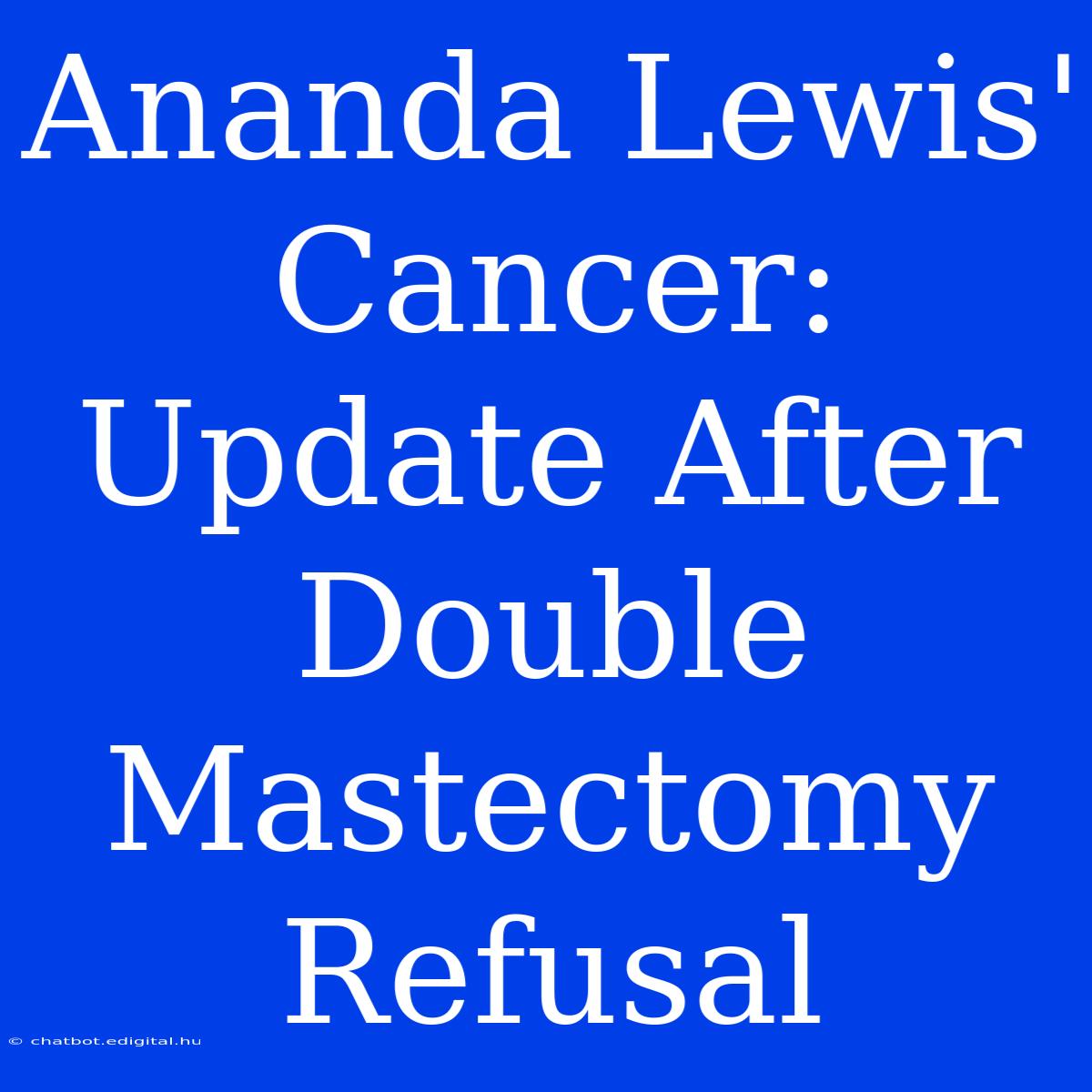Ananda Lewis' Cancer Journey: A Look at Her Choice After Double Mastectomy
How did Ananda Lewis approach her breast cancer diagnosis? Ananda Lewis' decision to refuse a double mastectomy has sparked conversation about the complexities of navigating a cancer diagnosis. This article delves into the reasons behind her choice, exploring the importance of individual agency in medical decisions and the emotional impact of such a life-altering diagnosis.
Editor's Note: This article provides an overview of Ananda Lewis' situation, drawing from publicly available information. It aims to offer insight into the complexities surrounding breast cancer treatment decisions and the importance of individual agency.
This topic is particularly relevant because it raises questions about patient empowerment, medical autonomy, and the emotional impact of a cancer diagnosis. This review will explore key aspects of Ananda Lewis' decision, including her personal perspective, the potential benefits and risks of a double mastectomy, and alternative treatment options.
Analysis: This analysis examines Ananda Lewis' situation, considering the available information and her public statements. We aim to shed light on the complexities of a cancer diagnosis and treatment decisions, emphasizing the need for a holistic approach that considers individual needs and perspectives.
Key Takeaways:
| Key Takeaways | Description |
|---|---|
| Informed Consent | Recognizing the importance of patient involvement in medical decisions. |
| Personal Choice | Understanding the right of individuals to choose their treatment paths. |
| Holistic Approach | Embracing a multi-faceted approach to cancer treatment that incorporates physical, emotional, and spiritual well-being. |
| Alternative Therapies | Exploring various treatment options beyond standard medical interventions. |
Ananda Lewis' Cancer Journey
Informed Consent and Personal Choice
Ananda Lewis' decision to refuse a double mastectomy highlights the importance of informed consent and the right to make personal choices regarding medical treatment. She has expressed her belief in the power of her body to heal and has chosen to explore alternative therapies alongside traditional medical interventions.
The Double Mastectomy: Benefits and Risks
A double mastectomy involves the surgical removal of both breasts. This procedure is often recommended for individuals with a high risk of developing breast cancer, particularly those with a family history of the disease. While it significantly reduces the risk of cancer recurrence, it also involves significant physical and emotional challenges.
Facets of the Double Mastectomy:
- Benefits: Reduced risk of cancer recurrence, potentially improving long-term survival rates.
- Risks: Surgical complications, pain and discomfort, changes in body image, potential psychological distress.
- Alternatives: Lumpectomy (removal of the tumor and surrounding tissue), radiation therapy, hormone therapy, chemotherapy, and alternative therapies.
Exploring Alternative Therapies
Ananda Lewis' decision to explore alternative therapies emphasizes the importance of a holistic approach to cancer treatment. Alternative therapies, such as diet changes, exercise, meditation, and herbal supplements, may not cure cancer but can complement traditional medical interventions, promoting overall well-being.
Facets of Alternative Therapies:
- Potential Benefits: Improved quality of life, reduced stress, potential support for immune function.
- Risks: Uncertain effectiveness, potential for interactions with other medications, lack of regulatory oversight.
- Importance of Research: Thorough research is essential to ensure the safety and efficacy of alternative therapies.
Conclusion
Ananda Lewis' choice to refuse a double mastectomy is a testament to the power of personal agency and the importance of navigating a cancer diagnosis with a holistic approach. Her decision highlights the need for open communication between patients and healthcare professionals, emphasizing the importance of informed consent and personalized treatment plans. It also underscores the potential benefits of exploring alternative therapies alongside traditional medical interventions, embracing a multi-faceted approach to healing.
FAQ
Q: What are the common reasons for refusing a double mastectomy?
A: Individuals may refuse a double mastectomy due to personal beliefs, concerns about side effects, preference for alternative therapies, or a desire to preserve their body image.
Q: What are the alternative treatment options available for breast cancer?
**A: ** Alternative treatment options include lumpectomy, radiation therapy, hormone therapy, chemotherapy, and various alternative therapies.
Q: How can I learn more about alternative therapies for breast cancer?
A: Research reputable sources such as scientific journals, government agencies, and organizations specializing in complementary and alternative medicine. Consulting with a healthcare professional is crucial before starting any new treatment.
Q: What are the emotional challenges of a cancer diagnosis?
A: A cancer diagnosis can evoke a range of emotions including fear, anxiety, sadness, anger, and uncertainty. It is important to seek support from loved ones, healthcare professionals, and support groups.
Tips for Navigating a Cancer Diagnosis:
- Educate Yourself: Learn about your diagnosis, treatment options, and the potential risks and benefits.
- Seek Support: Talk to loved ones, healthcare professionals, and support groups.
- Make Informed Decisions: Choose the treatment path that feels right for you, based on your values and preferences.
- Embrace a Holistic Approach: Consider alternative therapies to complement traditional medical interventions and promote overall well-being.
- Prioritize Your Mental Health: Seek professional help if needed to cope with the emotional challenges of a cancer diagnosis.
Summary
Ananda Lewis' journey through breast cancer diagnosis and treatment reflects the complexities of navigating this challenging experience. Her decision to refuse a double mastectomy raises crucial questions about individual agency, informed consent, and the role of alternative therapies. It emphasizes the need for compassionate care and the importance of understanding the needs and perspectives of each individual facing a cancer diagnosis.
Closing Message: Ananda Lewis' story encourages open dialogue about cancer treatment decisions, highlighting the importance of prioritizing individual needs and preferences. By embracing a holistic approach that incorporates both traditional and alternative therapies, individuals can empower themselves to navigate their cancer journeys with strength and resilience.

